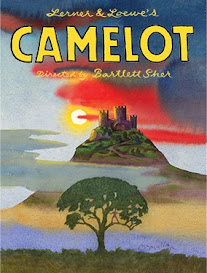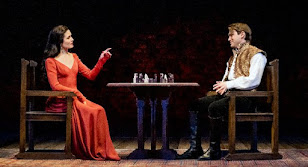 |
| Elizabeth McGovern as Ava Gardner |
A week's sojourn in Los Angeles developed a Hollywood theme - a visit to
the Academy Museum of Motion Pictures, a tour of Sony Pictures Studio and a play,
"Ava: The Secret Conversations," at the Geffen Playhouse in Westwood.
Elizabeth McGovern, who played Lady Grantham in "Downton Abbey," wrote the play and stars as actress Ava Gardner, who arrived in Hollywood at age 18 and attracted attention from the beginning for the kind of looks that society deems extremely beautiful.
The drama is based on the book, "Ava Gardner: The Secret Conversations," written by journalist Peter Evans after a series of interviews with the actress in the late 1980s.
What could have been a very talky play has been turned into a nifty piece of theater by director Moritz von Steulpnagel and scene, lighting, sound and projection designers David Meyer, Amith Chandrashaker, Cricket S. Myers and Alex Basco Koch.
 |
| Ava Gardner as Julie in "Show Boat" (1951) |
In publicity
materials for one of her movies, Gardner was described as “The World’s Most
Beautiful Animal.” She possessed dark eyes, full lips and a cascade of brunette
hair that all apparently turned men's nerves to water, with a cleft in her chin
that only added delicious intrigue. Her gaze was direct and a devastating
sexual come-on, and her appeal was that of a classy goddess.
Although Gardner never expressed much confidence in her acting talent,
she had a top-notch career, with her best-known movies in the 1940s and ‘50s
(“Show Boat,” “The Barefoot Contessa,” “The Killers”). Her private life was
equally in the headlines, with marriages to Mickey Rooney, Artie Shaw and Frank
Sinatra, as well as a long affair with Howard Hughes.
When we first meet Gardner, in her London apartment in 1988, she is 65
years old, in a grey sweatsuit and not in good shape. A stroke has affected her
left hand and she needs money, she informs her interviewer-to-be. “It’s either
do the book or sell the jewels and I’m kinda sentimental about the jewels,” she
tells him, in a voice redolent of cigarettes and whiskey.
Evans, played by Aaron Costa Ganis, intrigued that she called him, breaks
the fourth wall, speaking to offstage agent Ed Victor (Ryan W. Garcia) and agrees
to take on the project. There’s a bit of “Sunset Boulevard” vibe, with the writer
fascinated by the aging star.
Aaron Costa Ganis as Peter Evans
They enter a dance of biographer and subject, punctuated by Gardner’s desire
to tell her story on her terms and the writer’s awareness that the commercial
market wants to know about her sex lives with “Mickey,” “Frank,” “Howard” and a
legion of others.
She plays the game (“I loved to f---!”), then jumps back (“Let’s begin
the book with my stroke.”)
McGovern beautifully inhabits the mercurial Gardner, with a touch of the Grabtown,
N.C. accent that was so thick, MGM gave her voice lessons to modify it. Unintimidated
by the starmaking machine, she rose to the top, but also says, “They took away
my voice.”
In her sessions with Evans, Gardner seeks to know herself, in all her real
and fantasy roles. “I was the woman men dream about. Where’s my third act?”
She’s amusing, tough and honest about her bittersweet lives with famous,
strong-willed men. Divorced from the philandering Rooney and bullying Shaw by
age 23, her marriage to Sinatra was a tempest of alcohol and nightclubs, but
both also produced very solid work such as “Mogambo” (her only Oscar
nomination) and “From Here to Eternity” (an Oscar win and career resuscitator
for him). She reveals Hughes physically assaulted her, (“Oh, he pinned me to
the couch.”) in a matter-of-fact tone that appalls Evans.
In addition to Evans’
dialogue with the unseen agent, Steulpnagel skillfully uses projections of the
real Gardner, Sinatra, etc., lighting changes that flow with Gardner’s moods
and Evans’ confrontations and costume changes by Toni-Leslie James that by the end
see the fragile actress restored to glamor in a glittering black dress. 
Frank Sinatra and Ava Gardner
While McGovern is magnetic to watch, Ganis actually has the more difficult role. This extraordinary actor plays the British Evans in addition to Rooney, Shaw and Sinatra, in scenes from Gardner’s life.
Ganis doesn’t “do” imitations of each man, but subtly inhabits each persona and voice - including Rooney and Sinatra's very well-known voices. Leaving the theater, I heard more than one person remarking on Ganis’ great skill.
One question one has to ask is what relevance does this all have today? Much of the audience were people old enough to remember Gardner’s films and era (she died in 1990). In an age when women in show business have much more power – look at Beyonce, Lady Gaga? Kardashian? for example – how does Gardner’s story resonate?
For one thing, she’s not forgotten. There’s an Ava Gardner museum in Smithfield, N.C., not far from where she grew up, that welcomes 7,000 visitors per year.
Then in Hollywood, there’s no doubt women still face predatory men – witness the #metoo movement spurred by the sexual abuse charges against producer Harvey Weinstein. Actresses still face the challenge of balancing sexuality as performers with personal values and a sense of who they are.
Maybe there’s a lesson in the way Gardner never seems to be a victim, unlike perhaps another stunning beauty, Marilyn Monroe. Gardner certainly was not always in control and wild behavior hints at a deep unhappiness, but her core of steel told the world it would not get the better of her.
“Love is nothing,” is her conclusion, yet her vivid narration shows she held onto life with both hands and had few regrets.
In the end, the book project as it was envisioned in the beginning never came to fruition. Gardner withdrew her involvement when she learned Sinatra had sued Evans for mentioning certain Mob associations.
Years later, Evans wrote about doing the interviews in the book this play is based upon, but the text is more about him than her. The play sometimes feels disjointed, with too much attention focused on the less-interesting person.
In the end, Gardner remains an elusive character, to the biographer and possibly to herself.







